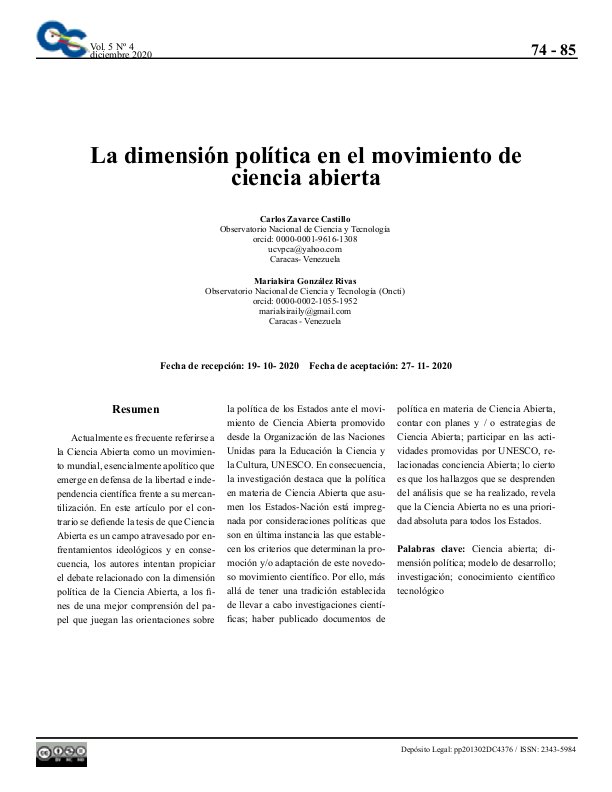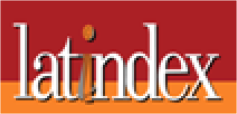Political dimension in the open science's movement
Keywords:
Open science; political dimension; development model; research; technological and scientific knowledgeAbstract
Nowadays, it is common to refer to Open Science as a global movement, essentially apolitical, that emerges in defense of freedom and scientific independence in the face of its commercialization.
Contrarily, this article argues that Open Science is a field crossed by ideological confrontations. In this sense, the authors try to promote the debate related to the political dimension of Open Science, to generate a better understanding of the role of the States' political approaches in the face of the Open Science movement promoted by the United Nations Educational, Scientific and Cultural Organization (UNESCO).
Consequently, the research highlights that the policy on Open Science assumed by the Nation-States is impregnated by political considerations that are ultimately those that establish the criteria that determine the promotion or adaptation of this novel scientific movement.
Therefore, beyond having an established tradition of carrying out scientific research, have published policy documents on Open Science, have Open Science plans and strategies, participate in the activities promoted by the UNESCO related to Open Science awareness; the truth is that the findings that emerge from this analysis reveal that Open Science is not an absolute priority for all States.
Downloads
References
Ciencia, tecnología e innovación en la República Argentina, (2020). https://www.argentina.gob.ar/ciencia/informacion-al-ciudadano/ciencia-abierta
CILAC, (2018): Declaración de Panamá sobre Ciencia Abierta. Recuperado en: http://forocilac.org/declaracion-de-panama-sobre-ciencia-abierta/
Constitución de la República de Venezuela (1999).
Copeland, D., (2016). Science diplomacy. In: Constantinou, C.M., Kerr, P., Sharp, P. (Eds.), The SAGE Handbook of Diplomacy. SAGE Publ. Ltd, London, Boston, 628—641.
Denmark, (2020). Denmark, Greenland and the Faroe Islands: King- dom of Denmark Strategy for the Open Science 2020, Ministry of Foreign Affairs of Denmark, Department of Foreign Affairs of Government of Greenland, Ministry of Foreign Affairs of Government of the Open Science, available online at: Recuperado en: https://um.dk/∼/media/um/english-site/documents/politics-and-diplomacy/greenland-and-the-OpenScience--islands/arctic%20strategy.pdf?la=en.
Evans, P. Jacobson, H. Putnam R, (1993). Double-Edged Diplomacy - International Bargaining and Domestic Politics. University of California Press Bekerley 94720. http://forocilac.org/declaracion-de-panama-sobre-ciencia-abierta/
Flink, T., Schreiterer, U., (2010). Science diplomacy at the inter- section of S&T policies and foreign affairs. Toward a typol- ogy of national approaches. Sci. Publ. Policy 37 (9), 665—677, https://doi.org10.3152/030234210X12778118264530
Hopkin, J., (2018). The comparative method. In: Marsh, D., Stoker, G. (Eds.), Theory and methods in political science. Palgrave, Lon- don, 285—307.
Johnson, B.R., Onwuegbuzie, A.J., Turner, L.A, (2007): Toward a def- inition of mixed methods research. J. Mixed Meth. Res. 1, 112— 133, Recuperado en: https://doi.org/10.1177/1558689806298224
Ley Orgánica de Ciencia Tecnología e Innovación, (2010).
ONCTI, (2020). Documento Nacional de Ciencia Abierta.
ONU, (2020). Un Llamamiento Conjunto por la Ciencia Abierta por parte de CERN, UNESCO y la OMS. Recuperado en: https://www.ohchr.org/SP/NewsEvents/Pages/DisplayNews.aspx
Phillips, N., Hardy, C., (2002). Discourse analysis. Investigating processes of social construction. Sage Publ, Thousand Oaks, 104 pp.
Pycroft, C. (2006). Addressing the Political Dimensions of Development. Asian Development Bank.
Turekian, V.C., Macindoe, S., Copeland, D., Davis, L.S., Pat- man, R.G., Pozza, M., (2015). The Emergence of Science Diplo- macy. In: Davis, L.S., Patman, R., G (Eds.), Science diplomacy. New day or false dawn. World Sci., Singapore, 3—24.
UNESCO, (2020). Consulta Regional sobre la Recomendación en Ciencia Abierta de la UNESCO - América Latina y el Caribe. https://events.unesco.org/event?id=1169217678&lang=3082
UNESCO, (2020). Hacia una recomendación de la UNESCO sobre la ciencia abierta: crear un consenso mundial sobre la ciencia abierta. Paris: UNESCO, 2020https://universoabierto.org/2020/11/20/recomendacion-mundial-sobre-la-ciencia-abierta-de-la-unesco/
Wagner, C.S., (2002): The elusive partnership. Science and foreign policy. Sci. Publ. Policy 29 (6), 409—417, Recuperado en: https://doi.org/10. 3152/147154302781780741.

Downloads
Published
How to Cite
Issue
Section
License

This work is licensed under a Creative Commons Attribution-NoDerivatives 4.0 International License.







